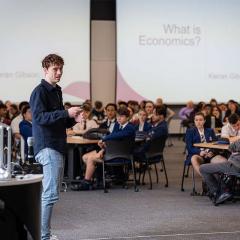Some Insight from an Evolutionary Perspective, a joint event between UQ’s Global Change Institute and Griffith University, was held on 22-23 October 2015.
The workshop provided interdisciplinary perspectives informing the transition to a sustainable economy and highlighted issues frustrating the transition. The following list includes some of the perspectives and frustrations:
- The Environmental Kuznets Curve indicates that as economies become wealthier they produce fewer emission but this relationship appears ill-founded and may result in policy inaction.
- Traditional economics uses constrained optimisation in climate change analysis but constrained optimisation ignores lock-ins that induce uncertainty.
- The requirement to help people develop self-awareness and self-control over their life choices and to design policy that accommodates a diversity of lifestyle choices. This contrasts with utility optimisation found in traditional economics with policy designed around forming the correct price signals.
- The requirement to evaluate and accept the physical limitations to economic growth and to prioritise the economic outputs within a sustainable economy. In contrast, traditional economics focuses on continued economic growth.
- The fossil fuel industry deliberately undermining the efforts to address climate change by confusing the public over the scientific consensus on climate change.
John Foster also presented his paper, Lock-in and uncertainty in complex economic systems: developing an alternative to conventional economics analysis, at the workshop.
EEMG staff Liam Wagner, Minoli Amarasinghe, Phillip Wild and William Bell also attended the event.



